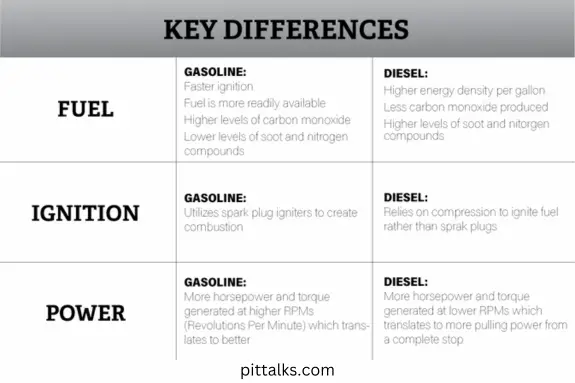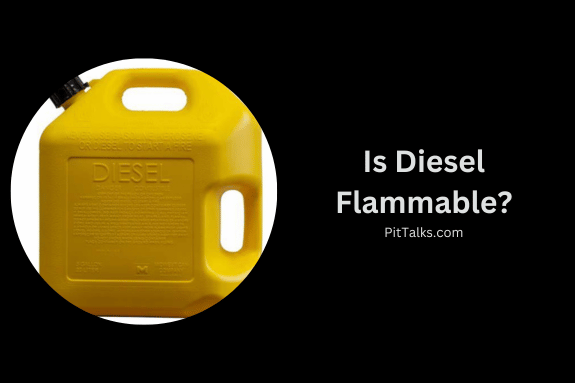Last Updated on October 16, 2023 by Pittalks
Picture this, you’re at a backyard barbeque, and the conversation turns to fuels. Someone confidently states, “Did you know that diesel is not flammable?” You might be taken aback.
Isn’t diesel fuel what powers our large trucks, construction equipment, and some cars? Isn’t diesel the substance that, when ignited, powers engines and machinery worldwide? Surely such a substance must be flammable! But if it’s not, then how does it work?
This article serves as your guide to understanding these questions and debunking the myth: is diesel flammable?
Diesel fuel is indeed a misunderstood commodity. Often, it’s compared to gasoline, its more commonly known counterpart, leading to several misconceptions. For starters, diesel and gasoline are fundamentally different.
Diesel is denser, less volatile, and it has a higher energy content than gasoline. These characteristics make diesel an efficient and powerful fuel, but they also contribute to the confusion about its flammability.
To clarify, when we talk about whether a substance is flammable, we’re asking if it can easily catch fire and burn. So is diesel fuel flammable? Well, the answer is more complicated than a simple yes or no. Let’s delve into the basics of flammability to understand this better.
Understanding Flammability: The Basics
Flammability is a measure of a substance’s ability to ignite or catch fire. It’s determined by several factors, including the substance’s flash point, autoignition temperature, and limits of flammability. Each of these factors plays a role in determining whether a substance is a flammable liquid or a combustible liquid.
A flammable liquid, as defined by the National Fire Protection Association (NFPA), is a liquid with a flash point below 100 degrees Fahrenheit. On the other hand, a combustible liquid has a flash point at or above 100 degrees Fahrenheit. The lower the flash point, the more susceptible the substance is to ignite, making it more hazardous.
It’s also worth noting that it’s not the liquid fuel itself that burns, but the vapors it gives off when it reaches its flash point. These vapors mix with the air to form a flammable or combustible mixture, which can ignite if an ignition source is present. Understanding these principles will help us evaluate whether diesel is flammable or combustible.
The Science Behind Diesel: Flammable or Combustible?
So, is diesel flammable according to the scientific definition? The answer lies in its flash point. Diesel fuel has a flash point of approximately 125 degrees Fahrenheit, well above the 100-degree mark that separates flammable liquids from combustible ones. Therefore, scientifically speaking, diesel is not a flammable liquid; it’s a combustible liquid.
But what does it mean for diesel to be a combustible liquid? Simply put, it means that diesel fuel won’t ignite easily at ambient temperatures. You need to heat it to its flash point before it emits enough vapors to form a combustible mixture with air. This is why diesel fuel doesn’t ignite as easily as gasoline, which is a flammable liquid with a much lower flash point.
However, this doesn’t mean that diesel is safe or poses no fire hazard. Under certain conditions, such as high temperatures or pressure, diesel can still ignite and cause a fire. The key takeaway here is that while diesel is less likely to ignite than some other fuels, it’s still capable of burning and should be handled with care.
Diesel vs. Gasoline Engines: A Comparative Study

To further understand why diesel fuel is combustible and not flammable, it’s helpful to compare diesel engines with gasoline engines. Both types of engines convert chemical energy in fuel into mechanical energy, but they do so in different ways.
In a gasoline engine, the fuel-air mixture is compressed and then ignited by a spark from the spark plug. Because gasoline is a flammable liquid, it readily vaporizes and forms a flammable mixture with air at ambient temperatures, which can be ignited by the spark.
In contrast, a diesel engine operates through compression ignition. The air is compressed first, which raises its temperature. Then, diesel fuel is injected into the combustion chamber. The heat of the compressed air is enough to raise the temperature of the diesel fuel above its flash point, causing it to ignite. This process doesn’t require a spark because diesel is a combustible liquid that can ignite from the high temperature alone.
| Fuel | Flash Point (°C) | Autoignition Temperature (°C) |
|---|---|---|
| Ethanol | -7 | 363 |
| Gasoline | -40 | 257 |
| Diesel | 52 | 210 |
| Jet Fuel | -43 | 210 |
| Kerosene | 37 | 220 |
| Vegetable Oil | >316 | ~ 350 |
| Biodiesel | >130 | ~ 266 |
For a more direct comparison, here’s a video going further into depth about the differences between diesel fuel and gasoline:
How Diesel Engines Work: The Role of Combustible Fuels
The operation of diesel engines exemplifies the role of flash points in combustible fuels. Because diesel has a high flash point, it can withstand the high compression in a diesel engine without prematurely igniting, which can cause engine knock. This high compression results in a more efficient combustion process, making diesel engines more fuel-efficient than gasoline engines.
The fact that diesel is a combustible liquid contributes to its safety in diesel engines. It’s less likely to ignite accidentally, reducing the risk of fire in case of a fuel leak or spill. However, this doesn’t exempt it from the risk of diesel fires, which can occur when diesel fuel is improperly stored or handled.
-Per the ProSource Diesel Team
We’ll break this down some more as we get into it, let’s keep moving.
The Flash Point: Key to Diesel Flammability
We’ve mentioned the flash point several times already, but it’s such a crucial concept in understanding whether diesel is flammable or combustible that it’s worth discussing in more detail. The flash point of a liquid is the minimum temperature at which it gives off enough vapors to ignite when exposed to an ignition source.
As we’ve seen, diesel fuel has a relatively high flash point compared to other fuels, which means it needs to be heated to a high temperature before it can ignite. This property makes diesel safer to handle and store than flammable liquids, but it doesn’t make it immune to the risk of fire. If diesel fuel is heated above its flash point, it can ignite and burn just like any other fuel.
Safety Measures: How to Store Diesel Fuel Safely
- Store fuels in well-ventilated areas away from ignition sources.
- Use approved containers or tanks designed for each fuel type.
- Wear protective clothing and avoid breathing in fuel vapors when handling.
Given that diesel is a combustible liquid, what are the implications for storing it safely? First and foremost, it should be stored in a cool, well-ventilated area away from ignition sources. Even though diesel has a high flash point, it’s still prudent to minimize the risk of accidental ignition.
Secondly, diesel fuel should be stored in an approved container or tank designed for combustible liquids. These containers are built to withstand the pressures and temperatures that diesel fuel can generate, reducing the risk of leaks or spills.
Finally, it’s important to handle diesel fuel with care. Despite its relatively low flammability, it can still cause skin irritation or other health hazards. Always wear protective clothing when handling diesel fuel, and avoid breathing in its vapors.
Diesel Fires: Causes and Prevention
While diesel fires are less common than gasoline fires, they do still occur and can be devastating. The main causes of diesel fires are improper storage, leaks or spills, and high temperatures or pressures that can raise diesel fuel above its flash point.
Preventing diesel fires involves a combination of proper storage, regular maintenance to detect and repair leaks or spills, and awareness of the conditions that can lead to a diesel fire. For example, avoid storing diesel fuel near heat sources or in direct sunlight, which can raise its temperature above its flash point.
It’s also important to act quickly if a diesel fire does occur. Because diesel is a combustible liquid, it burns at a slower rate than flammable liquids. This gives you more time to extinguish the fire before it spreads. However, diesel fires can still be intense and produce a lot of smoke, so it’s crucial to call the fire department immediately.
Debunking Myths: Is Diesel Flammable or Combustible?
At this point, we can confidently answer the question: diesel, is it flammable or combustible? Diesel is a combustible liquid, not a flammable one. It has a high flash point, which means it needs to be heated to a high temperature before it can ignite. However, this doesn’t mean that diesel is safe or poses no risk of fire. Under the right conditions, diesel can still ignite and burn, making it a potential fire hazard.
Unfortunately, the misconception that diesel is not among non flammable liquids persists because the term “flammable” is often used loosely to refer to anything that can catch fire. But as we’ve seen, there’s a significant difference between flammable and combustible liquids when it comes to their fire risk and safety measures. Recognizing this difference is crucial for handling and storing diesel fuel safely.
Here’s a video detailing the differences between flammable and combustible substances:
The Risk of Diesel Fires: An Unlikely but Real Hazard
While the risk of diesel fires is lower than that of fires involving flammable liquids, it’s still a real hazard that should not be overlooked. Diesel fires tend to occur less frequently because of diesel’s high flash point, but when they do occur, they can be severe and hard to control.
Moreover, diesel fires can pose unique challenges for fire fighting. Because diesel is a combustible liquid, it burns at a slower rate and produces a lot of smoke, making it difficult to extinguish. Water can spread a diesel fire rather than putting it out, so fire fighters must use foam or other special extinguishing agents to combat diesel fires.
Addressing Common Misunderstandings about Diesel Fuel
- Myth: Diesel is dirtier than gasoline.
- Fact: Modern diesel engines have advanced emission control systems that significantly reduce emissions.
- Myth: Vegetable oil is a safe alternative to diesel.
- Fact: Vegetable oil requires engine modifications to be used as fuel and may not be safe for all engines.
We’ve debunked the myth that diesel is not any less flammable than gasoline is, but there are other common misunderstandings about diesel fuel that we should address. One misunderstanding is that diesel is dirty and polluting. While it’s true that diesel engines can emit more particulates and nitrogen oxides than gasoline engines, modern diesel engines are equipped with advanced emission control systems that significantly reduce these emissions.
Another misunderstanding is that diesel is less safe than gasoline because it’s combustible. As we’ve seen, the fact that diesel is a combustible liquid actually makes it safer to handle and store than flammable liquids. However, this doesn’t mean that diesel poses no fire risk. It can still ignite and burn under the right conditions, so it’s important to handle and store it properly.
Read more from the flammability series:
Is hydraulic fluid flammable?
Is motor oil flammable?
Is power steering fluid flammable?
Is coolant flammable?
Is trans fluid flammable?
Is brake fluid flammable?
Conclusion: An Informed Approach to Diesel Safety
So, diesel is flammable? The answer is no, not in the way that most people understand flammability. Diesel is a combustible liquid that requires high temperatures to ignite and burn. However, this doesn’t mean that diesel is safe or poses no fire risk. Under the right conditions, diesel can still ignite and cause a fire.
The key to diesel safety is understanding its properties and handling it with care. Store it in a cool, well-ventilated area away from ignition sources. Use approved containers or tanks for storage. Be aware of the conditions that can lead to a diesel fire, and take action to prevent them.
By understanding the science behind diesel and debunking the myths, we can take an informed approach to diesel safety. Whether you’re a professional working with diesel fuel or a curious individual who wants to learn more, I hope this article has helped you understand why diesel is not flammable in the conventional sense—but still deserves respect as a combustible fuel.


